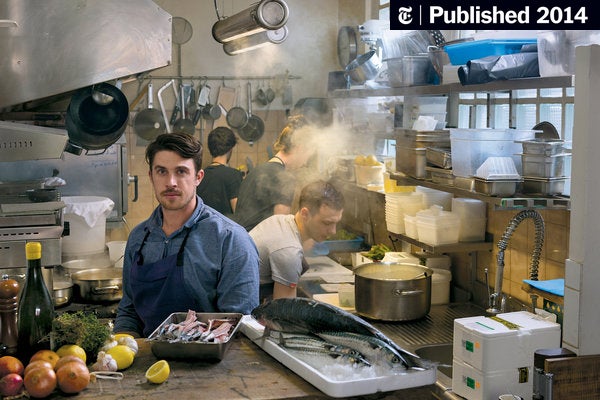The stirrings of insurrection began in the late ‘90s, with the advent of the bistronomie movement, during which some of the city’s most talented young French chefs eschewed the quest for Michelin stars in favor of opening no-frills bistros serving upscale fare at modest prices. (For generations of French chefs, it has been an article of faith that the more sumptuous the setting, the more likely a restaurant is to win Michelin’s approbation.) But the food they were serving was, on the whole, pretty conservative — classic French bistro fare made in a lighter style. Moreover, bistronomie was as much a reaction to economic circumstance — a weak French economy was a powerful disincentive to open luxury restaurants — as it was about remaking French cuisine.
Today diners are flocking to restaurants acclaimed by publications like Omnivore and Le Fooding, which focus on “young” cuisine and are at the forefront of the love of the new that is sweeping Paris. “The food scene is the strongest cultural movement in France right now,” Luc Dubanchet, Omnivore’s founder, told me recently. “For this generation, it’s what music was in the ‘60s and ‘70s.” In his view, this is now a watershed moment in French food history. The nouvelle-cuisine movement, which made French cooking lighter and more seasonal in orientation, was the last time French cuisine underwent a major overhaul. But that was primarily a revolt by a new generation of French chefs who, caught up in the revolutionary fervor of the late 1960s, wanted to liberate themselves from Escoffier classicism. What’s different today is that change is being led not from the kitchen but from the dining room. For the first time, Dubanchet says, young restaurantgoers are seizing control of France’s culinary tradition and making it their own.
In embracing expat chefs like Henry, these patrons are also signaling that French cuisine no longer belongs exclusively to the French. In 2010, the French food establishment succeeded in getting Unesco to designate what was termed “the gastronomic meal of the French” as part of the world’s cultural patrimony. The effort to win Unesco recognition generated some criticism in France, both because it was viewed as consecrating the idea that French cuisine had become an artifact, a museum piece, and because it was seen as an expression of French chauvinism. Regardless of the judgment of world bodies, what matters is what’s happening in the kitchens and dining rooms of the most exciting restaurants in Paris. The food there, for the first time in a long time, is very much alive.
BONES
The son of an Australian foreign-affairs official, James Henry lived as a child in Canberra, Paris, Riyadh and San Francisco before ultimately settling in Brisbane. He moved to Paris in 2010 and opened Bones to instant praise in January 2013. His menu changes daily and is based on seasonality and relationships with individual purveyors, like the farmer from the Ardèche who drives to Paris each week to drop off fruits and vegetables at Bones and a few other restaurants. Henry also makes his own charcuterie and churns his own butter. He demurs when asked if Bones serves French cuisine — “We use French product, but I don’t know how to describe it” — while suggesting that his ultra-artisanal approach has been instrumental in winning over French critics and diners. “It’s a way of touching a French person’s heart.”

